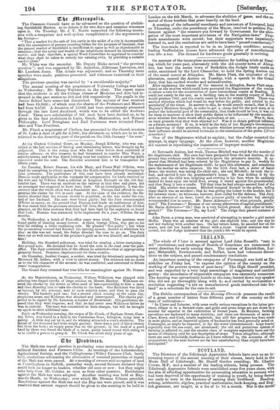gbt iprobincts.
The Malt-tax repeal question is producing some movement in the Agri- cultural Societies and Farmers Clubs. At meetings of the Leicestershire Agricultural Society, and the Collingbourne (Wilts) Farmers Club, lately held, resolutions advocating the alternative of restored protection or repeal of the Malt-tax were passed. At a meeting of owners and occupiers of land at Framlingham in Suffolk, yesterday week, several farmers declared they could look no longer to leaders, whether old ones or new: but they might take help from Mr. Cobden as soon as from other quarters. Resolutions against the Malt-tax were adopted. Another meeting was held at Hay- ward's Heath, on Wednesday; over which Mr. Thomas Ellman presided. Resolutions against the Malt-tax and the Hop-tax were passed; and it was resolved that earnest support should be given to the meeting to be held in
London on the 6th March, to advocate the abolition of tomes, and the re- moval of those burdens that press heavily on the land.
A meeting of the influential merchants and townsmen of Liverpool, held on Thursday, under the presidency of the Mayor, resolved to petition Par- liament against " the measure put forward by Government for the abro- gation of the most important provisions of the Navigation-laws." Free.. trade amendments were moved; but their supporters were impatiently listened to, and the resolutions are said to have been " passed unanimously."
The iron-trade is reported to be in an improving condition; several leading Staffordshire houses have advanced the price of manufactured iron 208. a ton. The demand for hardware goods generally is reviving.
On account of the incomplete accommodation for holding trials at Read- ing, which for years past, alternately with the old county-town of Abing- don, has been the assize town of Berkshire, the Judges lately made an order, sanctioned by the Lord Chancellor, to hold the Spring Assizes out of the usual course at Abingdon. Mr. Baron Platt, the originator of the alteration, opened the Assizes on Tuesday, with a speech to the Grand Jury, that has excited wonder and animadversion. After explaining the causes of the removal to Abingdon, Baron Platt expa- tiated on the motives which could have prompted the Magistrates of the county to refuse a rate for the construction of more commodious courts at Reading. It could not surely be the cost, as a farthing rate on the wealthy county of Berke would produce 700/, and the courts could be built for within 5,0001. There was another objection which had found its way before the public, and related to the peculiarity of the times. In answer to this, he would merely remark, that if her Majesty's Ministers thought, in order to get a cheap loaf for the poor man, or to protect the industrial part of the community, that trade should be free, it was not for them to murmur or allow their public duties to be influenced by the consider-
ation whether free trade would affect agriculture or not. Was it, then, on local grounds that they were objected to? Was it to obtain political influence on a future occasion? If so, it would be the duty of her Majesty's Government, and deserving of their attention, to inquire whether persons who so prostituted their influence should be allowed to remain in the commission of the peace. (Great sensation.) One of the Magistrates wished to explain; but the Judge resented the attempt, in angry language. At the close, however, another Magistrate did succeed in repudiating the imputation of improper motives.
At Newcastle Assizes, last week, Thomas Mitchell was tried for the murder of his illegitimate chid. The case had been postponed from the last Assizes, on the ground that evidence could be obtained to prove the prisoner's insanity. It ap- peared that Mitchell bad been ordered by the Magistrates to pay 2s. weekly for the maintenance of his illegitimate child; he paid this allowance, and sometimes gave the mother an extra sixpence. On the 25th June last, a sister of Sarah Brace, the mother, was taking the child out ; she met Mitchell; he took the in- fant, and carried it into the grandmother's house. He was holding it by the ankles, and the child was laughing and crowing in his face, when he suddenly dashed its head upon the brick floor, swung it round against the grandmother, and then flung it into a cradle. Till that time he had always seemed fond of the child. His mother was insane. Mitchell resigned himself to the police, telling them that it was an accident ; that he was giving the infant to the mother, but it fell between them: no witnesses, however, were called for the defence. The Jury, after an absence of an hour, found the prisoner guilty of murder, but strongly recommended him to mercy. Mr. Baron Alderson—" On what, grounds, gentle- men?" The Foreman—" Because of our strong abhorrence of capital punishment." Mr. Baron Alderson—" Oh! that is a very foolish ground. Any other or better ground?" The Foreman—" No, ray Lord." The Judge then passed sentence of death.
John Dunn, a young man, was convicted of attempting to murder a girl named Moffat. Dann was an admirer of the girl; she slighted him; and one day he saw her walking with another man. On her return home, he assailed her on the stairs, and cut her hands and throat with a razor. Capital sentence was re- corded, but the Judge intimated that the youth's life would be spared.


























 Previous page
Previous page